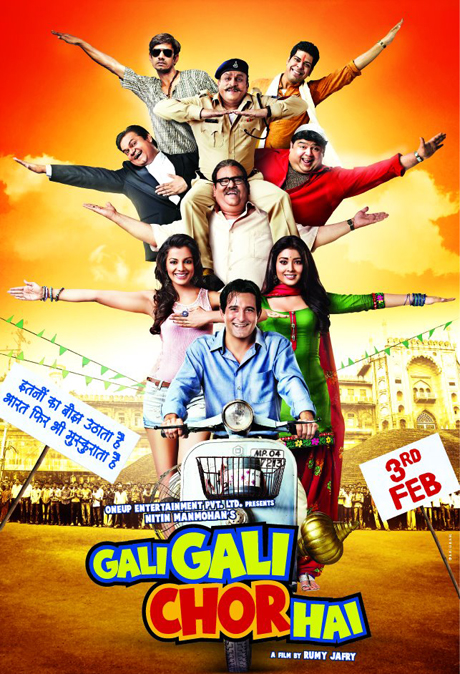 The common man might have upgraded from newspapers to television and cinema. But his chronicle continues to remain common. In a country governed by corruption, the common man is still ruled by red-tapism. The maximum that he can do is hurl a shoe at bureaucracy or slap the system. And that's precisely what the hero of the film does. Beyond that he and his story are as powerless as the common man.
The common man might have upgraded from newspapers to television and cinema. But his chronicle continues to remain common. In a country governed by corruption, the common man is still ruled by red-tapism. The maximum that he can do is hurl a shoe at bureaucracy or slap the system. And that's precisely what the hero of the film does. Beyond that he and his story are as powerless as the common man.
Bharat (Akshaye Khanna) works as a bank cashier who plays Hanuman in the local Ram Leela and aspires to upgrade to the lead role of Ram someday. When he refuses to offer his house for the political campaign of a local candidate (Murli Sharma), the politico's younger brother (Amit Mistry) gets him embroiled in a bureaucratic mess.
He is forced to reclaim from court, a table fan supposedly stolen from his house, for which he has to bribe everyone from the constable, witness, lawyer to even the thief. He ends up paying a fortune for the fan, which, in first place, was never his. Problems persist when he wishes to get rid of the ill-fated fan.
The basic theme and treatment of this political satire is right away reminiscent of Pankaj Kapur's popular TV series ' Office Office' which highlighted the common man's vulnerability against a corrupt system. The struggle for retrieving an object, which was neither yours nor desired by you, gives way for an interesting black comedy. Moreover in a society bogged down by bureaucracy to extremities and where anything and everything is possible, writers Mumukshu Mudgal and Rumy Jafry don't need to go that extra mile to make the black comedy believable enough. Things fall into place in the script almost through the inherent spirit of bribery. The narrative also smartly establishes the irony that when another household object is actually stolen, the cynical Bharat never reports its loss.
But once the 'systematic' exploitation is firmly established in the first half, the audience expects the tables to turn in the second half with hopes that the hero would give his detractors a taste of their own medicine. Sadly what follows is more turmoil for him in his attempts to get rid of the fan that boomerangs back. Since you identify with Bharat's common man character who is repeatedly at the receiving end, it becomes distressing after a while because you see your defeat in his. Some sequences are genuinely funny but by large the screenplay seems 'fan'atically stretched over a single conflict.
The actual scope for some (courtroom) drama in the climax is hastily edited in a transition song. While the social satire mocks at corruption through its runtime, in the climax, the hero has to resort to corruption to set himself free. Thereby this anti-graft drama sets a sad example for itself and endorses bribery, when everything else fails. And when you expect the politician's payback time to have actually started when the hero slaps him, you are surprised to see the end credits roll. Director Rumy Jafry never makes his common-man protagonist larger-than-life, perhaps implying that there is no practical solution to the widespread disease of corruption. Unfortunately his film hangs between neo-realism and escapism. The hero waving the national flag in end credits can induce artificial patriotism but not curb corruption.
The narrative is needlessly corrupted with love song and item number - both of which are absolutely avoidable. What's more redundant is a tangential track where Bharat's wife (Shriya Saran) doubts him of having an affair with the paying guest (Mughda Godse). The family drama remains unconnected with the core corruption saga and the film could have easily done without a romance track. The Ram Leela episodes that play in parallel makes for an interesting setting but the director could have used its analogy with the central plot more effectively.
Akshaye Khanna, for a pleasant change, doesn't go theatrical despite his staged Ram Leela acts. He maintains restrain in his performance and convincingly brings out the susceptibility of a common man without overdoing it either. Annu Kapoor, as the corrupt constable, dominates the bureaucratic escapades and is the scene-stealer. Vijay Raaz is funny in his two-bit role. Satish Kaushik, as the plump papa, plays his part well. Amit Mistry makes for a good villain. Shriya Saran looks beautiful. Mughda Godse was absolutely avoidable. Veena Malik's item number is downright vulgar. Despite a decent premise, this one falls short of being a fan-tastic film. Alas Gali Gali Bore Hai!